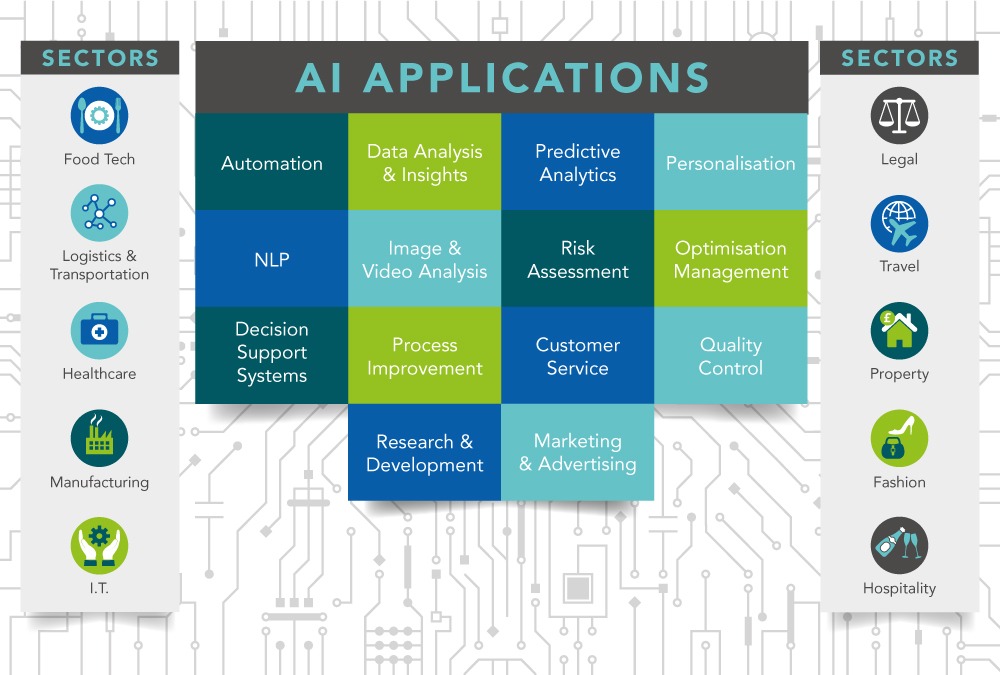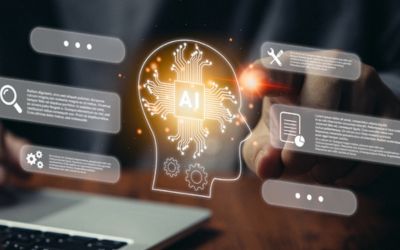In today’s fast-paced business landscape, enterprises are constantly challenged by a myriad of obstacles, ranging from operational inefficiencies to intricate decision-making processes. Overcoming these hurdles is pivotal for achieving enhanced performance and sustainable growth. Artificial intelligence (AI) has transcended its status as a mere buzzword, emerging as an indispensable asset for organisations seeking innovative solutions to their most daunting challenges.
Challenges such as information overload, inconsistent decision-making, inefficient resource allocation, and the demand for real-time insights can impede progress, hinder efficiency, and impact overall success. However, the integration of AI offers a remedy.
This article provides examples of how various industries are already leveraging AI, and explores how they’ve benefited from AI applications and their potential for future growth.
AI use cases in the healthcare industry:
- Medical Imaging: AI swiftly analyses X-rays and CT scans, improving diagnostic accuracy. It identifies lung nodules, reducing the risk of missing cancerous growths, and spots osteoporosis in X-rays.
- Personalised Treatment: AI uses patient data and genetic information to predict disease risks and tailor treatment plans. It helps select optimal chemotherapy drugs and monitors patients remotely, detecting early signs of conditions like heart disease.
- Electronic Health Records (EHRs): AI mines EHR data to predict disease risks and enable personalised prevention strategies. It forecasts risks such as diabetes or heart disease and prevents adverse drug reactions by analysing medication data.
- Fraud Detection: AI detects irregular patterns in healthcare data, preventing fraud by identifying activities like overbilling. It flags potentially fraudulent claims, ensuring resources are used for genuine patient care.
- Virtual Assistants: AI-driven virtual assistants offer remote patient guidance, handle administrative tasks, and provide medication information, enhancing patient satisfaction and relieving administrative burdens for healthcare professionals.
- Remote Patient Care: AI-powered remote patient care delivers healthcare services regardless of location. Patients share health data remotely, enabling proactive care, such as continuous monitoring of glucose levels for diabetic patients.
AI use cases in the retail and e-commerce industry:
- Personalised Shopping: AI analyses customer behavior to offer tailored product suggestions, enhancing the shopping experience and boosting engagement.
- Dynamic Pricing: AI algorithms adjust prices based on real-time market conditions and competitor pricing, maximising profits and ensuring competitiveness.
- Inventory Management: AI predicts demand patterns to optimise inventory levels, minimising overstock and stockouts, and improving supply chain efficiency.
- Chatbots for Customer Service: AI-powered chatbots provide instant support, enhancing customer service and satisfaction by addressing queries promptly.
- Visual Search: AI-driven visual search technology enables image-based product searches, improving search efficiency and accuracy, and simplifying catalog management.
AI use cases in the food technology industry:
- Supply Chain Optimisation: AI predicts demand, manages inventory, and improves logistics, reducing waste and ensuring efficient food delivery from farms to consumers.
- Quality Control: AI-powered systems detect defects and contamination in food products, ensuring only high-quality items reach the market.
- Flavor Optimisation: AI analyses consumer preferences to create innovative recipes that align with changing tastes, leading to appealing food products.
- Menu Customisation: AI personalises menus based on customer preferences and dietary restrictions, enhancing the dining experience and increasing customer satisfaction.
AI use cases in the financial industry:
- Fraud Detection: AI analyses transaction patterns for real-time fraud detection, enhancing financial transaction security.
- Credit Scoring: AI-powered credit scoring uses ML algorithms to assess creditworthiness accurately, improving risk management for lending decisions.
- Chatbots for Customer Service: AI-powered chatbots provide instant responses and personalised financial advice, streamlining customer interactions and improving satisfaction.
- Algorithmic Trading: AI algorithms analyse market trends and optimise investment portfolios, while robo-advisors offer automated investment advice, democratising wealth management services.
- AML Compliance: AI automates the analysis of transaction data to detect suspicious patterns, aiding financial institutions in complying with AML regulations and mitigating risks.
AI use cases in the supply chain and logistics industry:
- Warehouse optimisation: AI optimises warehouse layouts, maximising storage capacity and accommodating diverse inventory needs, ultimately improving efficiency.
- Shipment Tracking: AI enables real-time tracking, preemptively identifying delays and optimising delivery routes for timely and reliable shipments, boosting customer satisfaction.
- Traffic Management: AI monitors live traffic conditions and reroutes deliveries in response to disruptions, minimising delays and ensuring efficient arrivals.
- Inventory Automation: AI automates inventory management, monitoring levels and streamlining replenishment processes, reducing errors and optimising workforce efficiency.
- Resource Allocation: AI analyses workload data to optimise task allocation among workers, ensuring productivity by aligning tasks with skills and demand fluctuations.
AI use cases in the travel industry:
- Personalised Itineraries: AI creates tailored travel plans based on preferences, budget, and time constraints, providing unique experiences for each traveler.
- Real-time Recommendations: AI offers real-time updates and suggestions, guiding travelers to hidden gems and unique experiences beyond the typical tourist spots.
- Booking Assistance: AI-powered chatbots provide instant support during booking, helping travelers compare options and make informed decisions aligned with their preferences and budgets.
- Trip Planning Companion: AI suggests attractions and activities based on traveler preferences, optimising itineraries for efficiency and enjoyment, ideal for those with limited time.
- Smart Shopping: AI-powered apps compare hotels and offer personalised recommendations, allowing travelers to customise their stay for a memorable experience.
AI use cases in the estate agent industry:
- Automated Property Valuation: AI provides precise property valuations by analysing historical data and local market conditions, eliminating biases for consumers, sellers, lenders, and investors.
- Automated Property Management: AI streamlines property management tasks like maintenance scheduling and tenant screening, allowing managers to focus on strategic aspects and improve customer satisfaction.
- Portfolio Optimisation: AI maximises real estate portfolio returns by analysing datasets and predicting property values and market fluctuations, ensuring a balanced risk-return ratio through dynamic adjustments.
- Automated Lead Generation: AI identifies potential leads by analysing demographics and online behavior, predicting conversion likelihood to prioritise high-potential leads and increase conversion rates.
AI use cases in the media and entertainment industry:
- Music Recommendation: AI crafts personalised playlists based on user data, enhancing music discovery experiences on platforms like Spotify.
- AI in Gaming: AI improves game design by creating challenging levels and realistic NPCs, ensuring an immersive gaming experience.
- Enhanced Storytelling: AI augments content creation by providing insights into character development and plot structures, fostering stronger connections with audiences.
- Movie Editing: AI assists in creating impactful trailers and editing films by identifying key scenes and characters, streamlining the editing process for feature-length productions.
AI use cases in the manufacturing industry:
- Defect Detection: AI improves defect detection by minimising false alarms and manual checks, enhancing product quality and efficiency.
- Automated Assembly Lines: AI streamlines manufacturing processes by automating assembly lines, reducing errors, and increasing productivity.
- Predictive Maintenance: AI predicts equipment failures, enabling proactive maintenance scheduling to minimise downtime and optimise production uptime.
- Real-time Monitoring: AI enables real-time monitoring of production lines, allowing quick detection of anomalies and optimisation of processes for improved efficiency.
- Quality Control: AI automates visual inspections to ensure consistent product reliability, reducing waste and maintaining high-quality standards.
- Process Optimisation: AI analyses production data to identify inefficiencies and suggest improvements, enhancing productivity and reducing costs through continuous optimisation.
AI use cases in the automotive industry:
- Intelligent Traffic Management: AI optimises traffic flow, reduces congestion, and improves safety through dynamic signal control and route planning based on real-time data.
- Enhanced Navigation: AI-powered navigation systems offer optimised routes considering live traffic, weather, and road conditions, providing efficient paths and improved driving experiences.
- Personalised Customer Experience: AI tailors vehicle features, maintenance schedules, and customer interactions based on individual preferences, enhancing engagement and satisfaction with personalised recommendations and instant assistance from chatbots.
AI use cases in the education industry:
- Personalised Learning: AI tailors content and paths to students’ needs, boosting engagement and optimising outcomes.
- Intelligent Tutoring: AI-driven tutoring offers personalised guidance and feedback, adapting to individual learning styles.
- Automated Grading: AI streamlines grading, saving educators time and providing prompt feedback for a more efficient learning environment.
- Learning Analytics: AI analyses student performance data, enabling data-driven interventions and personalised support for improved success.
- Virtual Assistants: AI-powered assistants address student queries, offer resources, and handle administrative tasks, enhancing the learning environment with efficiency and accessibility.
AI use cases in the fashion industry:
- Trend Forecasting: AI predicts fashion trends by analysing diverse data sources, ensuring collections stay relevant.
- Merchandising Optimisation: AI optimises inventory and assortment planning, minimising excess stock and maximising profitability.
- Design Innovation: AI tools offer design suggestions and optimise patterns, streamlining the creative process and enhancing product development.
- Styling Assistance: AI provides styling recommendations and virtual try-ons based on customer preferences, delivering engaging shopping experiences.
AI use cases in the private equity and principal investment industry:
- Deal Sourcing: AI sifts through vast data to pinpoint investment opportunities, providing valuable insights for informed decisions.
- Due Diligence Automation: AI automates analysis of financial and market data, streamlining the evaluation process for investment opportunities.
- Risk Assessment: AI conducts comprehensive risk assessments using historical data and market trends, aiding in strategic decision-making.
- Portfolio Optimisation: AI optimises investment portfolios through data-driven recommendations for balanced and diversified assets.
- Predictive Analytics: AI forecasts market trends and potential disruptions, enabling proactive decision-making in strategic planning.
AI use cases in the legal industry:
- Contract Analysis: AI automates contract review, extracting key clauses for efficient document examination.
- Legal Research: AI analyses legal texts and precedents, accelerating research and aiding informed decision-making.
- E-discovery: AI efficiently analyses electronic documents and digital evidence, facilitating thorough legal examinations.
- Risk Assessment & Compliance: AI identifies legal risks, monitors compliance, and provides recommendations for risk mitigation.
- Chatbots & Virtual Assistants: AI-powered chatbots respond instantly to legal queries, streamline procedures, and enhance client communication.
- Document Automation: AI tools streamline document generation, reducing errors and ensuring consistency for more efficient legal workflows.
AI use cases in the information technology industry:
- Helpdesk Automation: AI-driven chatbots handle user inquiries and technical issues, freeing up IT professionals for strategic initiatives.
- Cybersecurity: AI monitors network traffic, swiftly identifying anomalies and mitigating potential security risks to safeguard data.
- Data Analytics: AI extracts insights from complex datasets, enabling data-driven decision-making and automating report generation.
- Software Development: AI automates coding processes, enhances code quality, and automates testing for higher software quality.
- IT Asset Management: AI automates asset discovery, monitors utilisation, and predicts maintenance needs, optimising resource allocation and streamlining operations.
AI use cases in the hospitality industry:
- Personalised Recommendations: AI analyses guest preferences for tailored recommendations on accommodations, dining, and activities.
- Revenue Management: AI optimises pricing strategies based on market trends and demand patterns to maximise revenue.
- Guest Sentiment Analysis: AI extracts sentiment from reviews to enhance guest satisfaction and address concerns promptly.
- Fraud Detection: AI identifies fraudulent activities in transactions, ensuring the security of online bookings.
- Smart Room Automation: AI automates room management for lighting, temperature, and personalised guest preferences.
- Language Translation: AI-powered translation services facilitate communication between guests and staff speaking different languages.
- Energy Efficiency: AI optimises energy consumption based on occupancy patterns, resulting in cost savings and sustainability.
In the evolving landscape of business, the integration of AI has become a cornerstone of success. Whether you’re in healthcare, finance, manufacturing, retail, or any other industry, the potential of AI to revolutionise your operations, drive innovation, and deliver unprecedented value cannot be overstated.
However, navigating the complexities of AI implementation requires expertise and guidance. That’s where a trusted partner comes in. A seasoned AI partner can help your organisation unlock the full potential of AI, from strategy development and technology selection to implementation and optimisation. By leveraging the expertise of a trusted partner, you can ensure that your AI initiatives are aligned with your business goals, seamlessly integrated into your existing processes, and designed to deliver tangible results.
No matter where your organisation is looking to implement AI, whether it’s enhancing customer experiences, optimising supply chain operations, or improving decision-making processes, a trusted partner can help you get the most out of your technology, processes, and investments.
Contact Redcentric to provide the right guidance and support so you can harness the power of AI to drive innovation, foster growth, and stay ahead of the competition in today’s dynamic business landscape.




